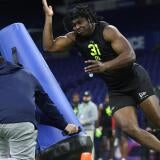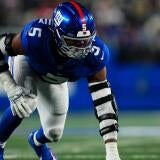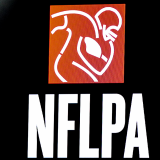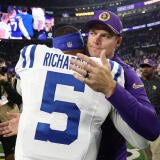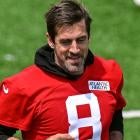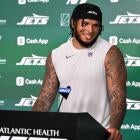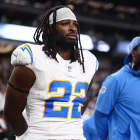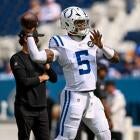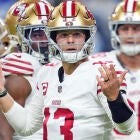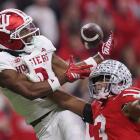Can Aaron Rodgers duplicate feats of Tom Brady, Matthew Stafford in Year 1 with Jets? Comparing each roster
Let's compare this year's Jets team to the Super Bowl winning Rams and Buccaneers

The Jets are chasing a recent trend with Aaron Rodgers. In 2020 and 2021, the Buccaneers and Rams famously added Tom Brady and Matthew Stafford respectively, two established veterans in the late stages of their NFL careers, and parlayed those signings to immediate Super Bowl victories.
Of course, the Chiefs snapped that two-year streak a season ago, but we're all still keenly aware that the veteran-quarterback addition can provide a franchise an instant, seismic boost.
That begs the question -- how similar are the 2023 Jets to the 2021 Rams and 2020 Buccaneers? Let's dissect each roster. I'm using a three-answer scale for the verdict in each category: almost identical, similar, and not alike.
Quarterback
In Brady's final regular season with the Patriots, he completed 60.8% of his throws, at 6.6 yards per attempt with a TD rate of 3.9% and INT rate of 1.3%. Rock-solid for many quarterbacks. Not exactly meeting typically Brady standards.
Rodgers' final season in Green Bay went as follows -- 64.6% completion rate, 6.8 yards per attempt, 4.8% TD rate, 2.2% of his throws were intercepted. Darn close to Brady's swan song season in New England.
Considerably younger, Stafford was at a 64.2% completion rate with 7.7 yards per attempt, a 4.9% TD rate and 1.9% INT rate in his last year with the Lions. With a boost in offensive line play, Cooper Kupp and Robert Woods plus Sean McVay's play-design brilliance, and yeah, no wonder the Rams went from 23rd in EPA per play in 2020 to 8th in that foundational analytics stat category in Stafford's first season in Los Angeles.
Brady and Rodgers were more similar in age and most recent season performance to Stafford, but altogether, this category earns an almost identical label. Right now, Rodgers feels somewhere between where Brady and Stafford were before joining their second teams.
Verdict: Almost identical (advantage: Rams)
Run game
In 2020, for the Buccaneers, Ronald Jones had a sneaky-good 978-yard campaign at 5.1 yards per carry. Leonard Fournette was bluntly not good during the regular season -- fewer than 400 yards at 3.8 yards per -- then morphed into Playoff Lenny by upping his yards-per-rush total nearly one full yard (3.8 to 4.7) en route to earning his ring.
Here's what I can say about the Rams run game the following season -- I completely forgot who led the team in rushing yards. Total blank. That's telling. In fact, it was Sony Michel who led the Rams with 845 yards. Darrell Henderson was the most efficient main ball carrier. He averaged 4.6 yards per tote. And it really was a two-man show. No one else eclipsed 50 yards on the ground! And there wasn't a transformative performance in the postseason either.
On paper, the Jets are light years more exciting as a running team, and I'm not even that concerned about Breece Hall coming off an ACL tear. He's 22 years old! For his body, healing is still a piece a cake. Before his injury a season ago, Hall, not Garrett Wilson, was tracking toward the offensive rookie of the year award. Behind him is the bouncy Michael Carter, Zonovan Knight, and Israel Abanikanda, who will make an impact in Year 1. Sure, this isn't an established running back room like the Buccaneers and Rams had. Heck though, I'll trade experience for fresh legs in my running back room any day.
Verdict: Not alike (advantage: Jets)
Pass catchers
I'll always be convinced the Buccaneers pass catchers -- and his confidence to lure Rob Gronkowski out of retirement -- were a key element to Brady deciding on Tampa Bay as his near-retirement snowbird destination. Mike Evans was still in his prime. Chris Godwin a budding superstar. As per usual, Brady dispersed the ball like a seasoned, MVP-caliber point guard. Six Tampa Bay skill-position players finished with 30-plus catches -- including Antonio Brown.
The following year, the Rams boasted Kupp, Woods, polished youngster Van Jefferson, and athletic tight end Tyler Higbee. Solid albeit unspectacular group after Kupp. They signed Odell Beckham Jr. in-season after his release from the Browns, and the flashy veteran caught five touchdowns down the stretch before snagging a pair of touchdowns in the postseason pre-Super Bowl injury.
The Jets stack up very closely. Not an envy-of-the-league unit. Hardly a pedestrian group either. Wilson is tracking toward stardom. Allen Lazard is a unique big body with the utmost trust of Rodgers. Mecole Hardman can stretch defenses vertically. The collection of Corey Davis, Randall Cobb, and Denzel Mims make for a respectable albeit unspectacular depth trio.
These three groups feel close, with maybe the Rams and Buccaneers having a slight advantage because we knew what those veteran quarterbacks were getting with Evans, Godwin, and Kupp.
Verdict: Almost identical (advantage: Buccaneers, slightly)
Offensive front
On draft night 2020, I vividly remember thinking "how in the world did the rest of the NFL let the Buccaneers draft Tristan Wirfs?" He was my OT1 in the class, right tackle was the one clear-cut need Tampa Bay had on offense, and three -- yes, three -- offensive tackles were selected in front of the Iowa mountain of a man before he was selected at No. 13 overall.
Wirfs was outstanding as a rookie, and the three-man interior of Ali Marpet, Ryan Jensen, and Alex Cappa was a group of club bouncers, and Donovan Smith held his own at left tackle. Stellar blocking unit in front of Brady.
The 2021 Rams had more of a patchwork, unproven offensive line, yet there wasn't a liability for defensive coordinators to target and Andrew Whitworth was still an elite pass blocker at left tackle. McVay's stretch-run/play-action offensive foundation mitigated any blocking deficiencies too.
This Jets team is directly between the 2020 Buccaneers and 2021 Rams but the weakest of the bunch. Alijah Vera-Tucker might become a Pro Bowl guard. He's returning from a season-ending injury last year. Duane Brown is your classic, wily veteran without All-Pro upside but a high floor. Mekhi Becton is a giant human and giant question mark. Laken Tomlinson will typically get the job done, and Joel Tippmann is likely the starting center as a rookie. This won't be a blocking unit that will carry the offense. And it could hinder the offense's efficiency at times. With Rodgers quick release, New York's offensive line shouldn't be that big of a stumbling block.
Verdict: Similar (advantage: Buccaneers)
Defensive front
A season ago, the Jets were seventh in the NFL in sacks (45) and sixth in team pressure rate (36%), and that was without a monstrous year from 2021 splashy free-agent signing Carl Lawson. At linebacker, Gang Green boasts a fine complementary starting duo of C.J. Mosley and the explosive Quincy Williams. A great but non All-Pro pairing. There's Quinnen Williams, who's weeks or months away from becoming the highest paid defensive tackle in football (probably), agitating bruiser John Franklin-Myers and two first-round picks at edge -- Jermaine Johnson and Will McDonald. Can't forget about recent signing Al Woods, who blocks out the sun in the middle.
The 2020 Buccaneers had an embarrassment of riches in their defensive front seven. Perennial near the top of the league pressure-creator Shaq Barrett, Jason Pierre-Paul reached 9.5 sacks during the regular season, Ndamukong Suh, the always-underrated Steve McClendon inside, and Vita Vea for five games, including the NFC title and Super Bowl. At linebacker, Lavonte David and Devin White. Serious speed, ferocity, and big-play capability.
The 2021 Rams were headlined by none other than Aaron Donald, got 9.5 sacks from long, springy edge rusher Leonard Floyd, brought in Von Miller and rotated the likes of chippy interior rusher Greg Gaines, Obo Okoronkwo, and Sebastian Joseph-Day up front. Oozing with diverse talent. The linebackers? Not memorable. Troy Reeder led all classic second-level defenders with 91 tackles for that Rams club. Rookie Ernest Jones flashed late in the season and, particularly, the Super Bowl. This was a front seven anchored by its defensive line.
Verdict: Similar (advantage: Buccaneers or Jets)
Secondary
Crank the intensity here. Collectively, these teams had/have the following defensive backs -- Sauce Gardner, Jalen Ramsey, Jamel Dean, Carlton Davis, Antoine Winfield Jr., D.J. Reed, and Jordan Whitehead (who was on the 2020 Bucs and 2023 Jets).
Not an easy task picking a winner here. In reality, all the secondary groups were built differently. The Jets and Rams were buoyed by superstar perimeter corners. The Buccaneers had a deeper talent pool at every position, including safety. The 2020 Bucs finished seventh in opposing EPA per drop back. The 2021 Rams were 12th. Last year, the Jets brought it defensively -- their unit was sixth in that critical category. New York does not need to be historically stingy in the secondary to win plenty of football games. And with Gardner leaning the way, they have the horses to be a top 10 pass defense once again in 2023.
Verdict: Almost identical (advantage: Rams or Jets)




